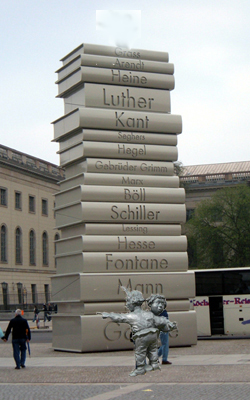Studying German within European Languages and Cultures
| NB: A-levels/vwo eindexamen/Abitur or equivalent with German as subject is obligatory to be admitted to German as major language. |

The more deeply you delve into the language, history, literature, films and media of present-day Germany, the more you will realize how unique the position of Germany in Europe is, what German culture and literature have to offer, and how important a role language plays in this. The University of Groningen enables you to immerse yourself in all things German, and to largely determine your own study programme.
Times before and after WWII as well as the histories of a split nation until the fall of the Berlin wall has shaped the identity of Germany today as a politically, economically and culturally strong player in Europe.
Why German?
If you would like to study the German language as well as German culture, politics and history, then the degree programme in European Languages and Cultures with German as a specialization may be just what you’re looking for. You will follow a broad programme in which you will focus on the German language, culture, politics and history and learn to contextualise it within a European framework. In addition, Groningen is just a short train ride away from Leer and Oldenburg.
You bring your mastery of German language to an expert level in small-group teaching in the intensive German proficiency part of the programme where content and language learning go together. For example, you learn the language by watching and discussing films and documentaries, monitoring the media, making vlogs and podcasts as well as writing journalistic texts in German.

The introductory course units of the BA programme help you develop an academic level of working and thinking as well as the accompanying skills. In the German-specific courses, you learn about German linguistics, culture, literature, history and politics. ‘German Linguistics’ introduces you to the structure of modern German, its language history and its numerous non-standard varieties. In ‘German Literature and Culture’, you learn about key authors of German literature, discuss their works from cultural-historical and political perspectives and familiarise yourself with methods of analysing texts. In ‘German Politics and Society’, you learn about German politics in the European context and against the backdrop of Germany's history in the 20th and 21st centuries. We look at the interplay between the most important political players and institutions at different levels of society and use specific historical developments and current topics to analyse the interactive processes of political events.
In your third year you have the opportunity to spend a semester following German course units abroad at one of the many partner universities in for example: Bremen, Frankfurt/Oder, Göttingen, Hamburg, Heidelberg, Jena, Kiel, Cologne, Leipzig, Mainz, Marburg, Münster, Oldenburg, Tübingen and Würzburg.
Back to European Languages and Cultures.

Marcella Herzog (student of ELC German)
After secondary school I spent a year in Austria, where I discovered how much I really liked the German language. So when I heard about the new degree programme in European Languages and Cultures in Groningen I immediately knew this was what I wanted! As an ELC student of German you get to immerse yourself in German culture and literary, social , historical and political themes. What I particularly like is the flexible setup of the programme. I specialize in the Politics and Society profile, which focuses on the political and social history of Europe and on current issues – and of course within this profile I concentrate on Germany. I am really looking forward to my stay at the University of Würzburg next year, where I can delve even more deeply into German language and culture!
| Last modified: | 25 March 2025 4.56 p.m. |
